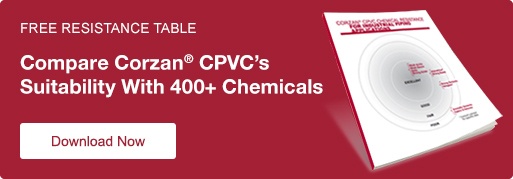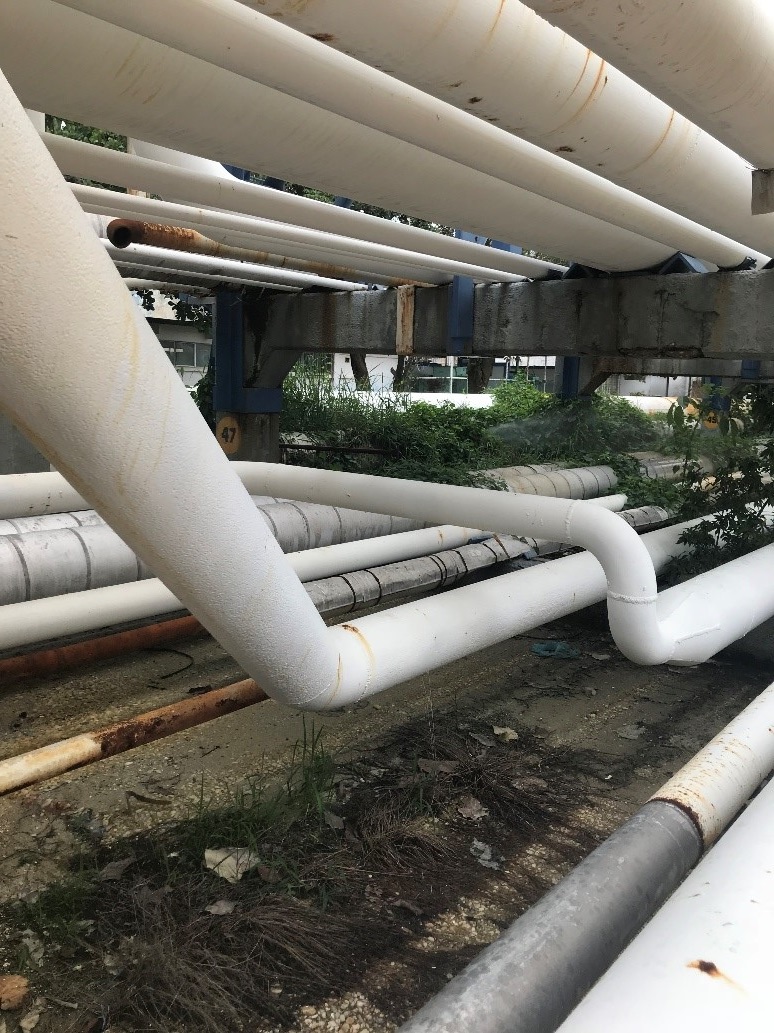Corzan® CPVC and Solutions for Loss of Containment Reductions
The question of how to avoid the damaging corrosive effects of harsh process chemicals on metallic piping should be the least of the worries of industrial operations and reliability personnel. When these shortcomings are plaguing your clients’ projects, consider implementing material review protocols that do not limit your options. Through no fault of their own, traditionally trained engineers are not immersed in the world of thermoplastics. Yet the implementation of alternate materials of construction review into your Loss of Containment reduction program can create a safer working environment for employees, and provide a more economical solution to a longstanding issue with corrosion.
CPVC is not one generic material
A standard go-to material for many common acids, bases and mixtures is CPVC. As referenced in the Chlorine Institute pamphlet 6, “When specifying plastic materials it is critical to not only specify the plastic type (PVC, CPVC, PP, etc.) but specify the manufacturer and the manufacturer’s grade (if applicable) of the plastic. In many cases plastic materials vary between manufacturers due to the formulations or production and even the same manufacturer may have different grades of the same plastic …” This is a major reason why engineers well versed in thermoplastics have made Corzan® CPVC the most specified industrial grade of CPVC in the world. It is a chemically-resistant alternative that provides a practical and cost-effective solution – and peace of mind.
Consult the most reliable source of chemical resistance data
The materials scientists at Lubrizol Advanced Materials have evaluated test data and field experience with more than 400 chemicals/compounds and maintain a chemical resistance chart to guide specifiers in planning their projects. The objective: to assure no premature degradation of piping due to the makeup of the medium flowing through it. The information, which is updated as needed, is based solely on piping made of Corzan CPVC and does not reflect the properties found with other suppliers of CPVC materials.
Given an assumed ambient temperature of 73°F, and varying maximum use temperatures for each of the 400 chemicals and chemical compounds, consulting the table will tell the specifier in each instance whether use:
- Is recommended, i.e., would lead to minimal or no swelling and/or loss in tensile strength, with low or no potential for Environmental Stress Cracking (ESC), used at any concentrations
- Provides satisfactory resistance, i.e., would lead to low to moderate swelling or degradation if used above certain temperatures and/or concentrations
- Could cause possible ESC, i.e., ESC is possible with mechanical stress on the material
- Is not recommended, i.e., use would lead to significant softening or degradation with loss in material strength
Establish chemical resistance, but consider other factors for success
Corzan CPVC’s versatility and wide range of applicability have been recognized by many facilities due to its ability to successfully operate in the first three categories of the chemical resistance chart. But assessing the chemical resistance suitability of a material is just the first step in evaluation of the proper material for an application with an extended design life. Engineers are also tasked with evaluating safety factors and affordability of material solutions. Corzan CPVC has become the quality specification requirement for facility owners wishing to have consistent performance, superior impact strength, and a technical support team ready to assist with application assessment.
A particular plus is that Corzan CPVC is available from several manufacturers. Lubrizol has partnered with best-in-class extrusion companies to enable globally available materials. For example, in the U.S., Corzan CPVC is available through our partner manufacturers, including GF Harvel, IPEX, NIBCO and Vycom. Having a complete system of pipe, fittings, valves, sheet, welding rod and other miscellaneous components readily at hand is part of the reasoning behind the high demand for Corzan CPVC technology, along with performance vs. relative cost.
Lastly, Lubrizol has a team of subject matter experts that support multiple verticals such as Chemical Processing, Pulp & Paper, Power Generation, Mineral Processing, Water Treatment, Food & Beverage, Chlor-Alkali, Semiconductor, Commercial Plumbing, HVAC & Data Centers. If you need assistance, it is available. To get started, check out this overview chart on chemical resistance and then download the full database of chemicals before making that next pipe material selection.


